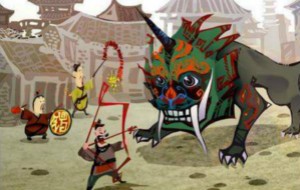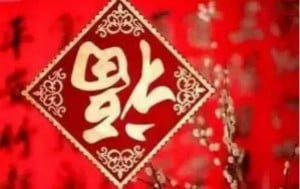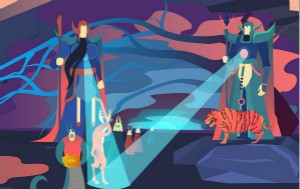Chinese New Year Legends
The Legend of Nian (The Legend of Why New Year is Celebrated)

Legend has it that in ancient China, there was a ferocious monster called 'Nian', which had horns, lived deep in the ocean all the year, and went onshore only on the New Year's Eve to eat animals and hurt human. As a result, all the villagers would flee to the mountains to escape from 'Nian' on Chinese New Year's Eve.
One year, the villagers of Taohua Village were about to flee to the mountains. Then, an old beggar with white hair and bright eyes walked on a crutch and came to the village and there was a bag on his shoulder. The villagers closed windows and doors, packed up or led oxen and herded sheep: the village was in panic and chaos. No one cared about the old beggar at this moment, and only an old woman at the east end of the village offered him some food and advised him to go to the mountains to elude the monster 'Nian'. The old beggar stroked his beards and smiled: ''if you allow me to stay at home for one night, I will drive out the monster.'' The old woman didn't believe it and tried to persuade him, but he insisted on staying. The old woman had no choice and left.
By midnight, 'Nian' burst in the village and found the village was different from the past: at the east end of the village, the old woman's house was brilliantly illuminated and there was red paper on the door. 'Nian' was shocked and cried. It glared at the house for a while and pounced on the house. When it reached the doorstep, 'Nian' heard the cracking sound from inside the yard and shuddered, dared not to move forward. It turned out that, what 'Nian' feared most were red, flame and cracking sound. Then, the door of the old woman's house was opened and the old beggar in red robe was laughing. 'Nian' was greatly frightened and ran away. When the villagers came back from the mountains in the next day, they found their village was in safety, and realized that the old white-haired man was actually an immortal who helped them to drive away the monster. At the same time, they found the three magic weapons used by the immortal to drive away 'Nian'. Since then, every Chinese family would paste red couplets, set off firecrackers, keep the house brightly illuminated and stay up late on the New Year's Eve. The custom became more and more popular, thus the most important Chinese festival - Spring Festival.
The Legend of Why Chinese People Paste Upside Down "Fu/福"

Every year, when the Chinese Spring Festival is coming, each family would paste all sizes of ''Fu'' characters (福) on their doors, walls or lintels. 'Fu' in Chinese means 'Good Luck' or 'Happiness', showing people's yearning for the happy life and good wishes for the future. Some people even paste the ''Fu'' upside down for the meaning of arrival of good fortune. About Why Chinese people paste upside down ''Fu'' character (福), there is a story.
Tradition has it that, Emperor Taizu of Tang prepared to kill people with the secret mark 'Fu/福'. To prevent the disaster, the kind-hearted Empress Ma ordered every family in the city to paste 'Fu/福' on their doors before the daybreak. One family was illiterate and pasted the character upside down. In the next day, the people sent by the emperor checked in the streets and found every family had pasted 'Fu/福' but one family pasted it upside down. The emperor got angry after listening to the report and ordered the palace guards to kill the family. Empress Ma heard the news and told the emperor: ''the family knows you will visit them, so they paste it upside down deliberately to welcome you, for the meaning of 'good luck arrives'!'' The emperor was convinced and ordered the palace guards to let the family go. A calamity was prevented. Since then, Chinese people paste upside down "Fu/福" to pray for good luck and commemorate the Empress Ma.
The Legend of Why Spring Couplets and Door Gods Are Pasted

It is said that the custom of pasting spring couplets can be traced back to Later Shu over 1000 years ago. According to historical writings, the original form of spring couplets was 'Tao Fu', a kind of peach wood charms hung on the gate during lunar New Year. An ancient Chinese mythology goes that, there was a mountain in the ghostdom and a peach tree covered a circumference of 3,000 miles on the mountain; on the treetop was a Golden Rooster. Every morning when the Golden Rooster announced the break of day, the ghosts wandered at night should come back to the ghostdom. The gate of the ghostdom was located in the northeast of the peach tree and it was guarded by two gods, namely Shen Tu and Yu Lei. If a ghost did something evil at night, it would be caught and tied up by Shen Tu and Yu Lei with a reed rope as the food for tigers. As a result, all the ghosts dreaded Shen Tu and Yu Lei; people in the folk carved the images of the two on the peach wood and hung the charms on the gate to ward off evil spirits. This kind of peach wood charms was called 'Tao Fu'. With the development of times, 'Tao Fu' also changed: people wrote the name of Shen Tu and Yu Lei on 'Tao Fu' to replace the images and later wrote the short poems, in symmetrical structure and with one-to-one correspondence, on 'Tao Fu'. This was the precursor of spring couplets. Nowadays, the spring couplets are wrote on red paper which has auspicious meanings.
To pray for good fortune, long life, health and peace, people in some places would paste Door Gods. Since Tang Dynasty, people also take Qin Shubao and Yuchi Gong, two military officers in Tang Dynasty, as the Door Gods in addition to Shen Tu and Yu Lei. It is said that, all evil spirits, ghosts and monsters would be scared away once the gate is pasted with two Door Gods. According to a legend, Emperor Taizong of Tang was sick and heard the cry of ghosts outside, thus felt restless for all the night. Therefore, he ordered the two military officers Qin Shubao and Yuchi Gong to hold their weapons and guard his gate. In the next day, he was no longer troubled by the ghosts. Later, Emperor Taizong asked people to paint the portraits of the two generals and paste on the gate. Hence, the custom was widely circulated in folk. Since the gate of Chinese folk house is in folios, the Door Gods are usually in pairs.
The Legend of Why Red Envelopes Are Given

Legend has it that, in ancient times, the ghost 'Sui' with black body and pale hands would come out to hurt children on the New Year's Eve. Once he touched the forehead of a sleeping kid with his pale hands, the kid would have a high fever and talk in sleep; after the fever was down, the originally smart kid would be clouded in mind and become stupid.
People worried that 'Sui' would hurt their children, so they kept their homes bright and stayed awake all the night to protect their children. The couple Guan had a baby at old age. To protect the hard-won kid, they forced him to play the eight copper coins wrapped with red paper; the kid opened and wrapped the copper coins with red paper again and again until he fell asleep. However, the couple dared not to sleep and they guarded the kid. By midnight, a fierce gale sprang up and 'Sui' came as usual. When he was to touch the forehead of the kid, a brilliant glare flashed out and 'Sui' was scared away. Later, the couple told everyone about the copper coins wrapped with red paper and every family followed the practice to scare away 'Sui'. Since then, no kid was hurt by the ghost.
The custom of giving red envelopes to scare away 'Sui' was handed down. Since old age and ghost are homophonous in Chinese, red envelope is also named lucky money given to ward off old age.
Chinese Calendar
| Su | Mo | Tu | We | Th | Fr | Sa |
|---|---|---|---|---|---|---|
| 1十四/14 | 2十五/15 | 3十六/16 | 4十七/17 | 5十八/18 | 6十九/19 | 7二十/20 |
| 8廿壹/21 | 9廿二/22 | 10廿三/23 | 11廿四/24 | 12廿五/25 | 13廿六/26 | 14廿七/27 |
| 15廿八/28 | 16廿九/29 | 正月 (Jan) 17初壹/1 | 18初二/2 | 19初三/3 | 20初四/4 | 21初五/5 |
| 22初六/6 | 23初七/7 | 24初八/8 | 25初九/9 | 26初十/10 | 27十壹/11 | 28十二/12 |
{{week}}. {{month}} {{day}}, {{year}}
Lunar Date
{{lmonth}} {{lday}}, {{syear}} ({{zodiac}}) Year ({{lyear}}){{sday}} Day, {{smonth}} Month
Clash {{clash}} | Evil {{evil}}
Auspicious
-
{{#luckly}}
- {{.}} {{/luckly}}
Inauspicious
-
{{#unluckly}}
- {{.}} {{/unluckly}}
Auspicious Times
-
{{#luckyTime}}
- {{.}} {{/luckyTime}}
